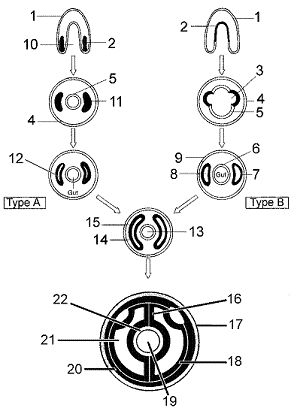What are the names of the three possible alternative stem loops that can form in mRNA?
What will be an ideal response?
pause, antitermination, and termination
You might also like to view...
Avery, MacLeod, and McCarty continued Griffith’s work with S. pneumoniae and concluded that DNA was the
hereditary material. If protein was the hereditary material instead of DNA, what would happen to mice after injection of heat-killed virulent bacteria mixed with live non-virulent bacteria after treatment with protease?
a. The mice would live. b. The mice would die. c. The mice would get sick but recover. d. The mice would grow tumors. e. The mice would degrade the protein.
Refer to Figure 30-1. The development pattern labeled Type B is characteristic of:

a. arthropods.
b. platyhelminths.
c. cnidarians.
d. echinoderms.
e. annelids
Which type of learning would be most beneficial for a person from New York City who is shipwrecked on an uninhabited tropical island?
A) Insight learning B) Operant conditioning C) Innate learning D) Habituation E) Imprinting
Sickle cell anemia (a serious heritable disease) appears to be maintained via balancing selection in some Af-rican populations, because heterozygous carriers for the fully recessive disease allele are less affected by ma-laria parasites
Is this a case of antagonistic pleiotropy? a. Yes, the same allele has positive effects on one trait and negative effects on another trait. b. Yes, wild-type and sickle cell alleles have antagonistic effects. c. No, there is no time lag between the two traits (i.e., as in early vs. late acting). d. No, it involves a dominance interaction between the wild-type and the sickle cell allele.